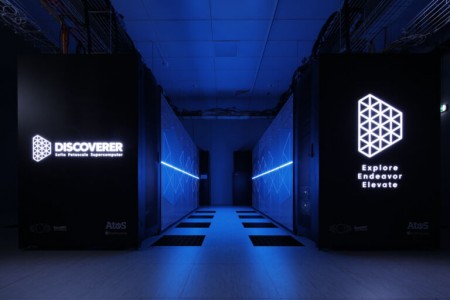Bulgarian supercomputer presents business opportunities from different parts of world at Thessaloniki Fair
The capabilities of Sofia Tech Park's Discoverer supercomputer were presented to the attendees of the Bulgarian Pavilion at the Thessaloniki International Trade Fair. The event started on 9 September and will continue until 17 September. Economy Ministry Bogdan Bogdanov attended the Fair on Sunday. The Economy Ministry is organizing the Bulgarian participation in the event, with Bulgaria being the Honoured Country this year.
Guests had the opportunity to observe real-time simulations presenting the capabilities of the supercomputer, which is in continuous operation. The audience was introduced to the application of supercomputers in real life and in business development, as well as historical data about their emergence.
There was a live demonstration of how the Sofia supercomputer works, as well as a recently completed project - a special product that enables businesses from anywhere in the world to use the supercomputer through a browser and pay only for the services they use.
"This allows us to sell the Bulgarian supercomputer and our users to work from anywhere in the world," explained the supercomputer's Chief Operating Officer, Kiril Kirilov. "The interface shows how much it costs per hour and then our customers receive their invoice depending on what they have spent," he added.
The cost depends on the software being used because each has a different license and licensing policy. The lowest cost is when the software is free, a situation that was shown during the presentation. Kirillov explained that products that do not require a specialized professional approach - commercials, for example - are rendered with Βlender software. Professionals in cinema and special effects use already paid versions of the software, because the free one has no such capabilities, but for many advertising agencies, for small and medium businesses, Βlender is a great solution, Kiril Kirilov pointed out.
The supercomputer can solve many complex problems. Among them, he highlighted the search for new proteins to fight tumors, the creation of a new drug, as well as space projects. "For example, we follow some waves that come from the collision of two black holes," Kirilov explained.
The business in the region can gain a lot of value and advantages through the Bulgarian supercomputer because the closest one is in Ljubljana, he added. "It is important for businesses that if they share the data, do not sell it and make a publication in a scientific journal, regardless of its rating, they get this service for free," he explained.
Natalie Valcheva, a student of Molecular Biology at Sofia University and a member of the iGEM Bulgaria synthetic biology team at the Bioinfotech laboratory in Sofia Tech Park, presented a bacterial system that produces enzymes that degrade antibiotics in the environment.
Antibiotic resistance is largely due to antibiotics being freely released into the environment. "We have targeted antibiotics that are released from hospitals because they are concentrated and are in large quantities," Boris Kirov, scientific head of the laboratory, told BTA. The project continues this year as the team wants to optimize the strains used to produce this substance. The lab is in talks with potential investors.
The lab also has a chip project for which it is also seeking funding. It is focused on a small device that can be used to find out which antibiotic will work for an infection in a few hours at home.
The activities of Sofia Tech Park as an innovation centre were also presented. Bulgarian participation continued with a presentation of virtual reality technologies.
